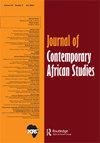Downstream to Kinshasa / film-documentary by Dieudonné Hamadi. Icarus Films: New York. 89 minutes / Colour. Swahili; Lingala / English subtitles. Release: 2021. Copyright: 2020
IF 0.8
Q2 AREA STUDIES
引用次数: 1
Abstract
treated Colonel Mengistu’s administration while doing the opposite for the insurgents. The author had visited several socialist and capitalist countries, and these experiences influenced him to evaluate the outcome of socialism in Ethiopia. Likewise, in the second half of Colonel Mengistu’s reign, he had spent several months in Ethiopia, and during his stay, he made numerous journeys to virtually all provinces. These journeys led the author to meet the participants in the events he describes. The author uses some scientific methods, like satellite images, to evaluate accurately harvesting in those years. The author writes about how the military and political policies of Derg determined the development of the country in terms of the economy and social life of the people. In all parts of the book, events are narrated chronologically and the book is artistically laid out. This makes the book attractive with photographs and interviews (full interviews, without any cropping) juxtaposed. Notwithstanding the book’s limitations, the author was a eye witness of the events which occurred during the reign of Colonel Mengistu. His insights are sharpened by the fact that he worked for the government of the United States, his connection to the Derg and his relation to both insurgent groups, the Ethiopian People Democratic Revolutionary Party and the Eritrean People Liberation Front. This make the book important to understand the history of Ethiopia in the 1970s and 1980s and for a study of this period.前往金沙萨的下游/ diudonn Hamadi的电影纪录片。伊卡洛斯电影公司:纽约。89分钟/彩色。斯瓦希里语;林加拉语/英文字幕。版本:2021。版权:2020
对待门格斯图上校的政府,而对叛乱分子采取相反的态度。提交人曾访问过几个社会主义和资本主义国家,这些经历影响了他对埃塞俄比亚社会主义成果的评价。同样,在门格斯图上校统治的后半段,他在埃塞俄比亚呆了几个月,在他逗留期间,他几乎到过所有的省份。这些旅程使作者遇到了他所描述的事件的参与者。笔者运用卫星图像等科学方法,对当年的采收情况进行了准确评估。作者写了德格的军事和政治政策如何在经济和人民的社会生活方面决定了国家的发展。在书的所有部分,事件是按时间顺序叙述的,这本书是艺术布局。这使得这本书的照片和采访(完整的采访,没有任何裁剪)并列。尽管这本书有局限性,但作者亲眼目睹了在门格斯图上校统治期间发生的事件。他曾为美国政府工作,他与民主革命党(Derg)的关系,以及他与两个叛乱组织——埃塞俄比亚人民民主革命党(Ethiopian People Democratic Revolutionary Party)和厄立特里亚人民解放阵线(厄立特里亚People Liberation Front)——的关系,使他的洞察力更加敏锐。这使得这本书对于理解20世纪70年代和80年代埃塞俄比亚的历史以及对这一时期的研究非常重要。
本文章由计算机程序翻译,如有差异,请以英文原文为准。
求助全文
约1分钟内获得全文
求助全文
来源期刊

Journal of Contemporary African Studies
AREA STUDIES-
CiteScore
2.20
自引率
0.00%
发文量
18
期刊介绍:
Journal of Contemporary African Studies (JCAS) is an interdisciplinary journal seeking to promote an African-centred scholarly understanding of societies on the continent and their location within the global political economy. Its scope extends across a wide range of social science and humanities disciplines with topics covered including, but not limited to, culture, development, education, environmental questions, gender, government, labour, land, leadership, political economy politics, social movements, sociology of knowledge and welfare. JCAS welcomes contributions reviewing general trends in the academic literature with a specific focus on debates and developments in Africa as part of a broader aim of contributing towards the development of viable communities of African scholarship. The journal publishes original research articles, book reviews, notes from the field, debates, research reports and occasional review essays. It also publishes special issues and welcomes proposals for new topics. JCAS is published four times a year, in January, April, July and October.
 求助内容:
求助内容: 应助结果提醒方式:
应助结果提醒方式:


